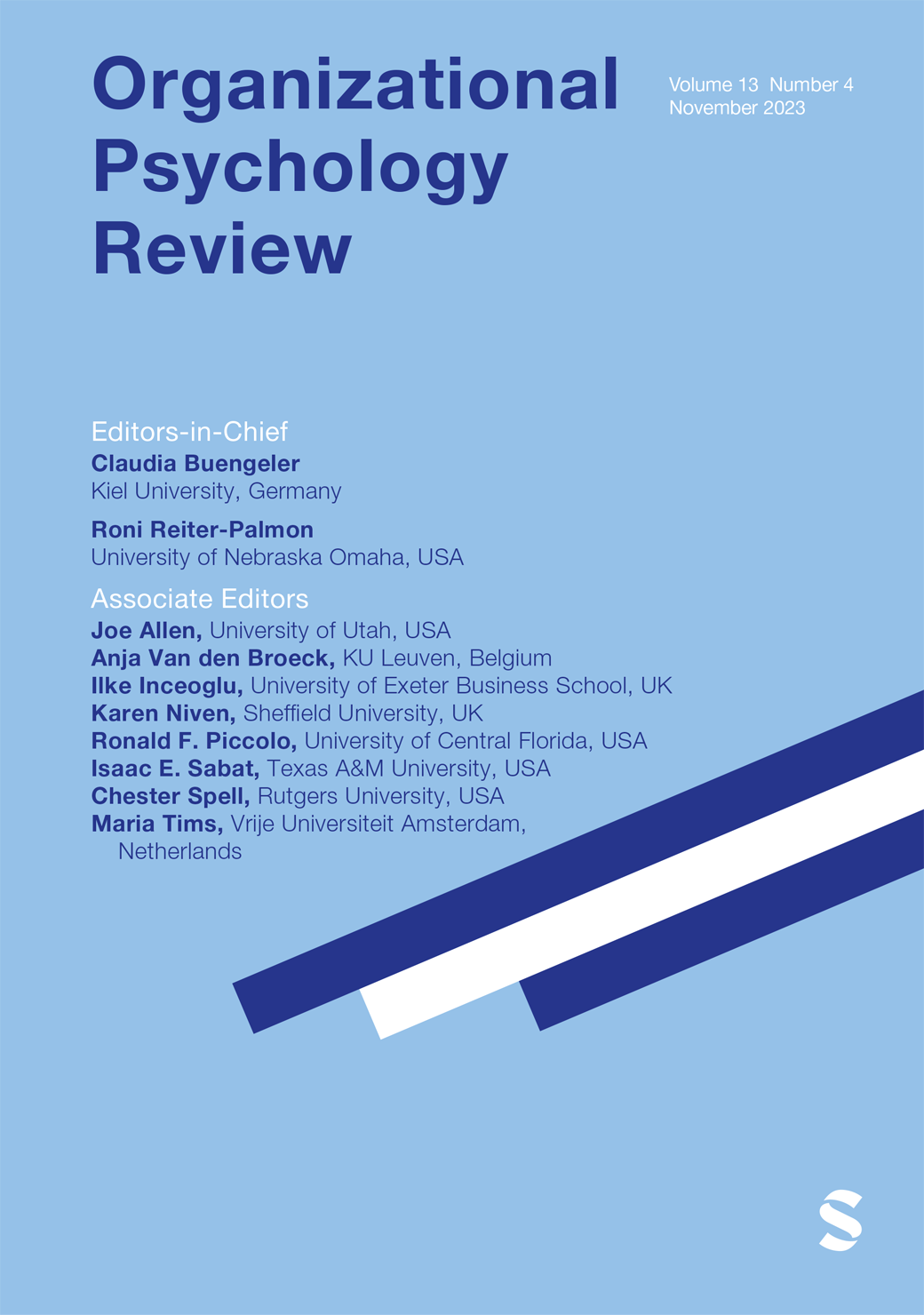学习型组织与创新工作行为:社会图式理论视角下的有调节中介模型
IF 7.1
1区 心理学
Q2 MANAGEMENT
引用次数: 1
摘要
目的。本研究旨在探讨创新自我效能感在学习型组织-创新工作行为关系中的中介作用。此外,本研究还探讨了自我领导在学习型组织-创新工作行为和创造性自我效能感-创新工作行为关系中的调节作用。研究设计。来自制造部门(制药和汽车)的361名员工和126名直接主管(官员)自愿参与了数据收集调查。使用不同的统计软件(即AMOS v.22, Smart-PLS v.3, SPSS v.25和PROCESS-macro),对假设的关系(即直接,间接,调节和调节的中介)进行了测试。发现。本研究发现,创新自我效能感在学习型组织与创新工作行为的关系中起部分中介作用。自我领导对学习型组织-创新工作行为和创造性自我效能感-创新工作行为的关系具有调节作用。对实践的启示。本研究揭示了学习型组织对于提高员工创新工作行为的重要性。世界范围内前所未有的快速变化提高了竞争水平,要求改变工作结构。员工的创造性自我效能感有助于管理层通过创新行为来克服这种不确定性。此外,自我领导在学习组织文化和创造性自我效能的支持下对创新工作行为的增强起着至关重要的作用。结果的值。本文的研究解释了如何克服商业世界中不确定变化的情况,对管理有帮助;此外,本研究还回应了当前时代出现的未解决的问题,例如组织如何增加其员工的创新行为以获得生存和竞争优势。此外,本研究通过解释创造性自我效能感的干预作用和自我领导的调节作用,在工作心理学和组织行为学方面增加了知识。本文章由计算机程序翻译,如有差异,请以英文原文为准。
Learning organizations and innovative work behaviors: A moderated mediation model from the perspective of social schema theory
Purpose. The present study aimed to examine the intervening impact of creative self-efficacy amid learning organizations — innovative work behaviors relationships. Also, this study investigates the moderating role of self-leadership amid learning organizations — innovative work behaviors and amid creative self-efficacy — innovative work behaviors relationships. Study design. Three hundred sixty-one employees and one hundred twenty-six immediate supervisors (officers) voluntarily participate in the data collection survey from the manufacturing sector (pharmaceutical and automobile). Using different statistical software (i.e., AMOS v.22, Smart-PLS v.3, SPSS v.25, and PROCESS-macro), the hypothesized relationships (i.e., direct, indirect, moderation, and moderated mediation) were tested. Findings. The present study’s findings reveal that creative self-efficacy partially mediates the learning organizations— innovative work behaviors relationships. Also, results indicate that self-leadership moderates the learning organizations — innovative work behaviors and creative self-efficacy — innovative work behaviors relationships. Implications for practice. The present study enlightens the importance of learning organizations for enhancing innovative work behaviors in the workforce. Rapid worldwide unprecedented changes increase the competition level and require a change in the working structure. Creative self-efficacy of the employees helps the management overcome this uncertain situation through innovative behaviors. Additionally, self-leadership plays a vital role with the support of learning organizational culture and creative self-efficacy for enhancing innovative work behaviors. Value of theresults. The present study will be helpful for management by explaining how to overcome the situation of uncertain change in the business world; also, this study responds to the unanswered questions which occur in the current era, such as how organizations increase the innovative behaviors of their workforce for survival and competitive advantage. Moreover, this study adds knowledge to work psychology and organizational behavior by explaining the intervening role of creative self-efficacy and moderating role of self-leadership.
求助全文
通过发布文献求助,成功后即可免费获取论文全文。
去求助
来源期刊

Organizational Psychology Review
Multiple-
CiteScore
10.00
自引率
1.60%
发文量
25
期刊介绍:
Organizational Psychology Review is a quarterly, peer-reviewed scholarly journal published by SAGE in partnership with the European Association of Work and Organizational Psychology. Organizational Psychology Review’s unique aim is to publish original conceptual work and meta-analyses in the field of organizational psychology (broadly defined to include applied psychology, industrial psychology, occupational psychology, organizational behavior, personnel psychology, and work psychology).Articles accepted for publication in Organizational Psychology Review will have the potential to have a major impact on research and practice in organizational psychology. They will offer analyses worth citing, worth following up on in primary research, and worth considering as a basis for applied managerial practice. As such, these should be contributions that move beyond straight forward reviews of the existing literature by developing new theory and insights. At the same time, however, they should be well-grounded in the state of the art and the empirical knowledge base, providing a good mix of a firm empirical and theoretical basis and exciting new ideas.
 求助内容:
求助内容: 应助结果提醒方式:
应助结果提醒方式:


